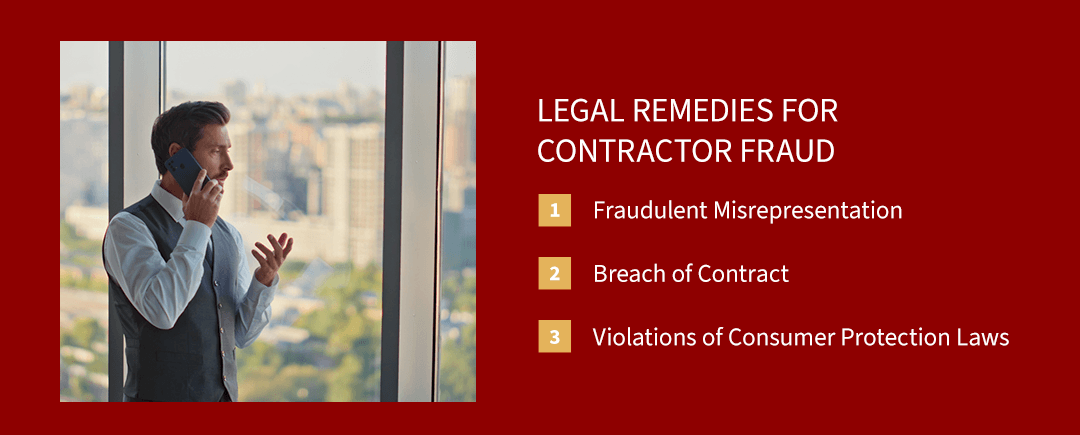Suing a builder for fraudulent practices can be a complex and daunting process. At Calabrese Law Associates, we focus on construction law and are dedicated to protecting your rights. Our experienced team will guide you through every step, ensuring you understand your options and pursue the compensation you deserve for any damages caused by deceitful actions.
Learn the meaning of construction fraud, the available remedies, and mitigating factors.
What Is Fraud in Construction?
Fraud is a deliberate deception or misrepresentation designed to benefit one party at the expense of another party. In other words, it involves intentionally misleading someone for personal or financial gain. Fraud can take various forms and can occur in different contexts. Common examples include the following:
- Bid rigging: Generally, bid rigging involves collusion among contractors to manipulate the bidding process. The aim is to ensure that certain contractors win contracts at inflated prices.
- False billing: This activity involves submitting invoices for work the contractor never performed. In other instances, contractors perform the task but inflate material and labor costs.
- Kickbacks: Some suppliers or vendors pay contractors or subcontractors in exchange for awarding them contracts or purchasing their products.
- Material substitution: Contractors or subcontractors may use inferior or different materials than those specified in the contract but charge for high-quality materials.
- Misrepresentation of qualifications: Contractors or subcontractors may exaggerate their experience, skills, or financial stability to secure contracts.
Construction fraud can have serious implications, such as financial losses and project delays. If you have any suspicions, contact the attorneys at Calabrese Law Associates immediately.
Legal Remedies for Contractor Fraud
You can sue a contractor if you suspect them of fraud. To succeed, you must demonstrate that you have a valid cause of action and substantiate your claim with evidence. A cause of action is a combination of facts that entitles a party to a legal remedy. Examples include the following:
1. Fraudulent Misrepresentation
Misrepresentation is a false statement of fact made by one party to another to induce them to enter into a contract or take some action. There are three main types — innocent, negligent, and fraudulent. Under fraudulent misrepresentation, the contractor knowingly provides false information or withholds vital details to gain an advantage.
If you bring this cause of action, you must demonstrate that:
- The contractor misrepresented material facts — facts a reasonable person would find essential to making a wise decision.
- The builder engaged in deliberate misrepresentation or should have known they were making false statements.
- The contractor misrepresented facts to influence your actions or decisions.
- You reasonably relied on the information the builder supplied and experienced damages or loss.
Remember, you must provide evidence to support your claim.
2. Breach of Contract
A breach of contract arises when one party fails to fulfill their obligations under a contract. In construction fraud cases, you may rely on the agreement between you and the builder, pointing out specific violations or breaches. Remember, a contract could be oral or written, but verbal agreements are challenging to establish and support. Again, you must demonstrate that you suffered a loss due to the breach — financial or otherwise.
3. Violations of Consumer Protection Laws
In Massachusetts, consumer protection falls under Chapter 93A of the Massachusetts General Laws. This law extends to construction projects and protects the property owner as the consumer. A builder can face steep penalties if found to have engaged in unlawful, unfair, or fraudulent business practices.
For example, a contractor may be held liable for double or triple the amount to repair damage plus applicable attorney fees and costs. Faced with such outcomes, it’s often possible for experienced attorneys to negotiate favorable settlements.
Can You Sue a Homebuilder for Negligence?
Yes, you may sue a contractor or homebuilder for negligence in certain instances. Negligence refers to a failure by one party to exercise reasonable care, leading to injury or damage to another party. It is distinct from intentional misconduct and requires you to demonstrate the following:
1. Duty of Care
You must demonstrate that the contractor had a legal obligation to act or refrain from acting in a certain way. This duty generally requires them to perform with the level of care, skill, and diligence that a reasonable professional in the construction industry would exercise. For example, they must adhere to industry standards, regulations, and contractual obligations.
2. Breach of Care
Next, you must show that the contractor failed to act according to the expected standard of care. In the context of construction fraud, a breach of care may include:
- Providing false or misleading information about qualifications, capabilities, or work performed.
- Failing to deliver materials or services as promised.
- Misrepresenting costs, timelines, or project scopes.
- Concealing defects or issues related to the construction work.
3. Causation
Third, you must establish a causal link between the breach of duty and the harm. It consists of actual and proximate causes. Actual cause requires you to prove that the damage or loss would not have occurred but for the contractor’s actions. Proximate causation requires you to show that the damage or loss was reasonably foreseeable.
4. Damages
Lastly, you must establish that the contractor’s actions caused you to suffer damages, such as financial loss, workplace injuries, or structural defects.
Whether it is hasty execution, lack of research, or simply lazy performance, there are several circumstances where negligence could lead to defects, including:
- Design defects: These defects arise from inaccurate or poor construction plans. If the original design contained errors known to the builder and allowed construction to proceed, they may be held liable for resulting costs and damages.
- Work defects: A builder can create these issues by failing to produce an end project adhering to construction codes and standards. Doing so can create foundation issues, poor aesthetics, and structural instability.
- Material defects: Material defects occur when a builder incorporates damaged or unsuitable components or materials to finish a project. When the builder knew or should have known that the materials failed to meet acceptability standards but proceeded with their use, the homeowner may have a viable claim against the builder.
Other possible claims for negligence could arise from:
- Failure to obtain required building permits.
- Accidents on the property resulting from a failure to secure the construction site or properly use the equipment.
Establishing negligence can be complex and challenging, reinforcing the need to consult an experienced legal professional at Calabrese Law Associates.
Evidence in Homebuilder Lawsuits
You must support your claims with evidence to succeed in any construction fraud lawsuit. Gathering the proper evidence can make a difference in your case. Well-organized evidence can help establish credibility and build a strong case. Moreover, substantial evidence can encourage settlements, as the opposing party may be more willing to negotiate in the face of compelling proof of wrongdoing.
There are different types of evidence, including:
- Documentary evidence: This refers to physical or electronic documents such as contracts, invoices, emails, and photographs.
- Witness testimonies: Witnesses include experts and fact witnesses. Expert witnesses are professionals with specialized knowledge in a field, while fact witnesses are individuals with direct knowledge of the events.
The rules surrounding evidence, such as relevance and admissibility, are complex, so it’s best to work with an experienced attorney.
Fraud Prevention Measures
You can employ several measures to mitigate the risk of fraud. These include:
- Conducting due diligence: Due diligence involves investigating the parties in the transaction or project to ensure their credibility and reliability. For example, you can conduct background checks on the contractors’ qualifications, reputation, and any past instances of fraud.
- Identifying early red flags: As you learn about the other party, look for signs of potentially fraudulent activities. Examples include inconsistent documentation, pressure to expedite decisions, unusual payment requests, and frequent change orders.
- Preparing clear contracts: Before signing any agreement, ensure it outlines the terms, obligations, and specifications. The contract should contain detailed specifications to limit opportunities for fraud. Also, provide clear terms for changes in the project and dispute resolution clauses.
- Conducting regular inspections: Monitor the project regularly, considering the specifications, materials, labor, and other key factors. Demand progress reports detailing completed work and issues faced. Hiring a professional to audit the project periodically and provide a compliance report would be ideal.
Why Trust Calabrese Law Associates?
At Calabrese Law Associates, we understand the complexities and challenges of suing a builder for fraudulent practices. With years of experience in construction law and a proven track record, our dedicated team is committed to protecting your rights and interests. We take the time to investigate your case thoroughly, gathering essential evidence and expert testimony to build a strong claim.
Our client-centered approach ensures that you receive personalized attention and clear communication throughout the legal process. We are passionate about holding builders accountable for their actions and securing the compensation you deserve for any damages incurred.
Trust us to navigate the legal landscape with skill and integrity, providing the support you need during this challenging time. Let us advocate for justice against fraudulent practices in the construction industry.
Contact a Contractor Fraud Lawyer at Calabrese Law Associates
A legal professional with construction and contract experience is the ideal source of guidance and advocacy. Calabrese Law Associates is the solution for industry-leading legal representation for affordable fees in the Greater Boston area.
When you partner with us, you have compassionate and responsive attorneys who make your best interests our priority. We’ll give you top-quality legal advice and explore options for out-of-court solutions to help you save time and money. If litigation is necessary, rest assured you have an experienced lawyer to help you navigate the process.





